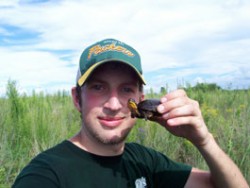 Hank Vogel holds the first rare Blanding’s turtle he found this summer. |
Hank Vogel, a student in the Drake University Undergraduate Science Institute’s summer research program, discovered a new population of rare Blanding’s turtles during a survey of reptiles and amphibians at Chichaqua Bottoms Greenbelt in northeast Polk County.
“I reached into the trap for the turtle and right away I saw it was a Blanding’s. It had a bright yellow neck with a lot of yellow spots on its head,” Vogel said. “It was a real surprise; I would never have guessed it would have been there.”
Blanding’s are classified as threatened in the state of Iowa, meaning they are at risk of becoming extinct. It is illegal to collect or kill them.
“There was just the one, but because it was a yearling and Blanding’s turtles are pretty sedentary you can bet that there’s an older male and female and perhaps other nestlings nearby,” said Keith Summerville, assistant professor of environmental science at Drake, soon after the find.
He was right – the next week, Vogel found another young Blanding’s.
“Finding a population of Blanding’s at Chichaqua Bottoms tells us that the large restored landscape is really working to provide habitat for declining species,” Summerville said.
The Chichaqua Bottoms Greenbelt spans more than 10 miles of land in northeast Polk County and includes more than 500 acres of restored wetland area along the Skunk River. Prior scientific surveys in Iowa had turned up the turtles, but never evidence of their reproduction.
Vogel measured the age and size each turtle (yearlings, the first 6 inches and the second 4.5 inches) and quickly released it.
The DUSCI summer research program enabled 30 Drake students and a high school student from Ames to conduct research projects alongside Drake faculty. Students worked on projects ranging from the study of environmental estrogens to the development of a science-based addition education program for high school students that uses video game development and virtual reality technologies.
Vogel said he’s enjoyed his work with the program. “It’s been a real relaxing summer – sometimes it’s really hot, and you’re in these waders that aren’t very cool, and there’s lots of bugs, but we’ve done a lot of good work and had a lot of fun.”

